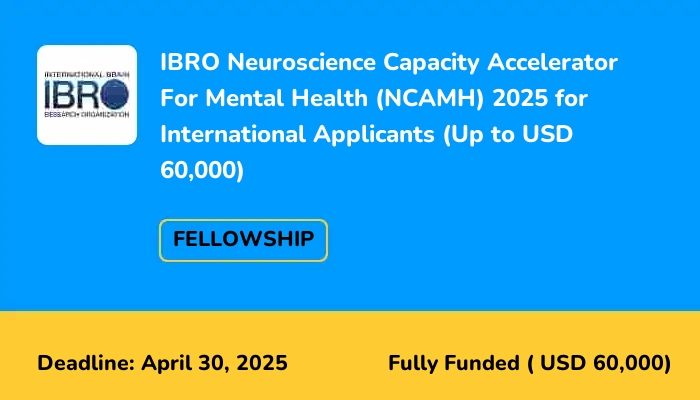Are you interested in participating in a unique and impactful career opportunity to establish a research collaboration with a focus on mental health? We invite you to apply to the Neuroscience Capacity Accelerator for Mental Health (NCAMH), an innovative program dedicated to enhancing neuroscience research capacity and fostering transformative collaborations in Low- and Middle-Income Countries (LMICs), with a focus on driving progress in understanding and addressing anxiety, depression and psychosis.
About International Brain Research Organization (IBRO)
I have had a unique opportunity to appreciate how effective IBRO is as a really worldwide organization in neuroscience, highly flexible and with minimal bureaucracy. Relying on human power, creativity and generosity, IBRO does not represent any national strategy or policy, and truly gathers all of them. Despite fantastic progress and technological and scientific achievements in brain research, the global village of neuroscience is still far from being global. Lots of work is needed. � Marina Bentivoglio, IBRO Secretary General (2007-2009) IBRO is the global federation of neuroscience orga... continue reading

Subscribe for scholarship update!
Be among the first to know whenever new International Brain Research Organization scholarship is going on. Enter your email address and click the Subscribe button ↓
IBRO Neuroscience Capacity Accelerator For Mental Health (NCAMH)
Aim and Benefits of IBRO Neuroscience Capacity Accelerator For Mental Health (NCAMH)
This program aims to enhance neuroscience research related to mental health in Low- and Middle-Income Countries (LMICs), with a focus on building research capacity and accelerating the potential for impactful research programs.
Benefits:
Each selected project will be supported with up to USD $60,000 in funding. Please note that salary and other overhead expenses are not eligible for funding under this grant.
IBRO Neuroscience Capacity Accelerator For Mental Health (NCAMH) Courses
Requirements for IBRO Neuroscience Capacity Accelerator For Mental Health (NCAMH) Qualification
Collaboration Details:
- This program is open to researchers and clinicians with existing collaborations or those seeking new opportunities to expand their research with a small group of partners (typically 2-3 collaborators in total).
- Collaborations may be international or domestic.
- Project collaborators must be from different institutions. Collaborators from the same institution, even if they belong to different departments, do not meet this requirement.
- Applicants can be employed by higher education institutions, research institutes, non-academic healthcare organisations, or not-for-profit organizations.
- Individuals who have previously received a NCAMH grant (or previously served as a project collaborator) are not eligible to apply.
Project Leaders:
- Project leaders must be based in and affiliated with an institution in a LMIC and have the experience and support structures necessary to drive and lead a collaborative research project.
- Project leaders must hold independent investigator status at the LMIC institution, meaning they are eligible to serve as a Principal Investigator (PI) on independent research grants. They do not need to currently hold a grant, but their institutional role must allow them to apply for and manage external funding as the lead researcher. We understand that job titles may vary according to regional context.
Project Collaborators:
- Project collaborators are not required to be based in or affiliated with a LMIC.
- Project collaborators must hold independent investigator status if joining the project in the capacity of a researcher.
- Project collaborators must bring complementary skills and resources essential to the delivery of the project.
Project proposals should:
- Start from September 2025 and be for a duration of 9 months.
- Focus on advancing knowledge in neuroscience with relevance to furthering our understanding of the development and/or resolution of anxiety, depression and psychosis as broadly defined categorizations, or exploring new opportunities for early interventions in these conditions.
- Demonstrate the potential for long-term scientific collaboration, with a clear plan for developing future research proposals.
- Address ethical considerations in both study design and uptake (if applicable).
Teams conducting research projects involving human participants and collecting data on anxiety and/or depression must use at least one of the following recommended measures, relevant to their research question:
- Patient Health Questionnaire PHQ-9 (adults – depression)
- General Anxiety Disorder questionnaire GAD-7 (adults – anxiety)
- Revised Child Anxiety and Depression Scale RCADS-25 (children and adolescents – depression and anxiety)
- World Health Organisation Disability Assessment Schedule WHODAS-12 (adults – impact on functioning)
Lived Experience Involvement
We strongly advocate for the meaningful involvement of LE experts in mental health research. Historically excluded, LE perspectives are vital and their long-term engagement in research projects ensures improved applicability, relevance and acceptability of findings to the end users.
Grant applicants are encouraged to consider how the inclusion of LE perspectives could enhance their projects on anxiety, depression, or psychosis. However, proposals are not required to include an engagement plan or practical LE component. Capacity building in LE involvement will be facilitated after grants are awarded.
Application Deadline
April 30, 2025How to Apply
Interested and qualified? Go to
International Brain Research Organization (IBRO) on ibro.smapply.org to apply
To get started:
- Create an applicant account here.
- Refer to the Frequently Asked Questions (FAQs) for any inquiries.
- For technical issues with the site, submit a customer support request form.
- Please submit your application using this link, accessible during the application period.
For more details visit: IBRO website.
 Menu
Menu

